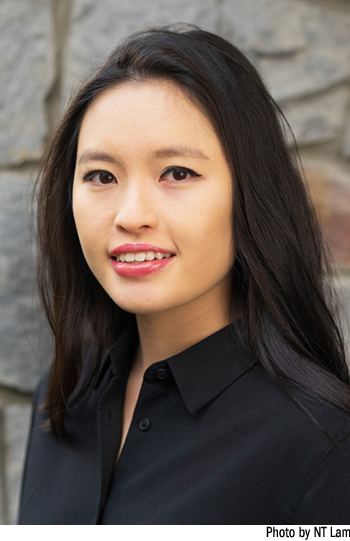Author Vanessa Le on YA Debut ‘The Last Bloodcarver’ | 5 Questions and a Rec
In this Q&A series, SLJ poses five questions and a request for a book recommendation to a debut YA author. In the latest installment, Vanessa Le shares about The Last Bloodcarver.
 In this Q&A series, SLJ poses five questions and a request for a book recommendation to a debut YA author. In the latest installment, Vanessa Le shares about The Last Bloodcarver.
In this Q&A series, SLJ poses five questions and a request for a book recommendation to a debut YA author. In the latest installment, Vanessa Le shares about The Last Bloodcarver.
1. Congrats on your YA debut! How would you describe your book to readers?
On the surface, The Last Bloodcarver is a medical magic murder mystery about a girl who can alter anatomy with a touch, hired to heal the last living witness of a murder. But I truly wrote this story about the burden of legacy, and how one lonely girl grapples with it while sniffing out a murderer.
 2. What drew you to YA to tell this story?
2. What drew you to YA to tell this story?
For me, YA is a sweet spot—mature enough to touch on themes I want to address, but also widely accessible for children and adults alike. It was the age where stories truly changed my outlook on the world, so I wanted to add to this growing collection of literature that can hopefully impact kids in the future.
3. What, if anything, surprised you while writing it?
When writing first drafts, I don’t always plan for themes. That’s a second, third draft problem. Of course, I came into The Last Bloodcarver with an idea of what I wanted to say, which was about how isolating it sometimes felt to be Vietnamese American. But when I read the story back, I found unintended themes of legacy, acculturation, and grief that were all relevant to my life at the time. Naturally, it took a couple more rewrites and editorial rounds to truly bring those themes to the forefront, but they ultimately shaped the story a lot more than the ones I had planned from the start.
4. Tell us more about the characters. Which character do you most identify with and why?
The main character, Nhika, was a vessel for all my struggles at the time—with identity, belonging, and family. All of the other characters are mirrors of her: Andao and Mimi struggle with remembrance in the face of loss; Trin represents her journey of acculturation; and Kochin is someone she might’ve been, in another life. Because I gave Nhika so many of my unique adversities, I identify greatly with her—although, her confident and brazen personality is quite opposite to my own.
 5. What do you hope readers will take away from this book?
5. What do you hope readers will take away from this book?
This story was written during a time when I was struggling with what it meant to be Asian American. All this uncertainty manifested itself as a character, Nhika, living in a world that doesn’t accept her. Throughout the novel, she labors against the burden of her cultural heritage after she’s lost all the people who might remember it. Without spoilers, she does find reconnection through small moments and unexpected allies. As I wrote this book, I was finding out answers to our shared struggle just as Nhika was. In many ways, I feel like I created this story, selfishly, for myself. However, I’m not alone in this journey. If my readers are going through such trials with identity, isolation, and legacy, I hope they take away a sense of solace: the full weight of legacy is no one’s burden to bear alone. And for those who might not see themselves in the characters or the struggle—that’s perfectly fine! I hope I’ve written a fun enough tale that everyone is able to find something to enjoy within The Last Bloodcarver’s pages.
6. Finally, we love YA and recommendations—what’s your favorite YA book you've read recently?
Recently, I read and loved The Prison Healer by Lynette Noni. It’s another book that features a healer main character—but the twist is that she heals within the confines of a prison. I absolutely loved the mix of pharmacy and magical worldbuilding, as well as the questions of duty and justice that are explored when a healer’s patients fall on all sides of a political conflict—one that inadvertently ropes in the main character herself.
Add Comment :-
RELATED
The job outlook in 2030: Librarians will be in demand
The job outlook in 2030: Librarians will be in demand
ALREADY A SUBSCRIBER? LOG IN
We are currently offering this content for free. Sign up now to activate your personal profile, where you can save articles for future viewing





